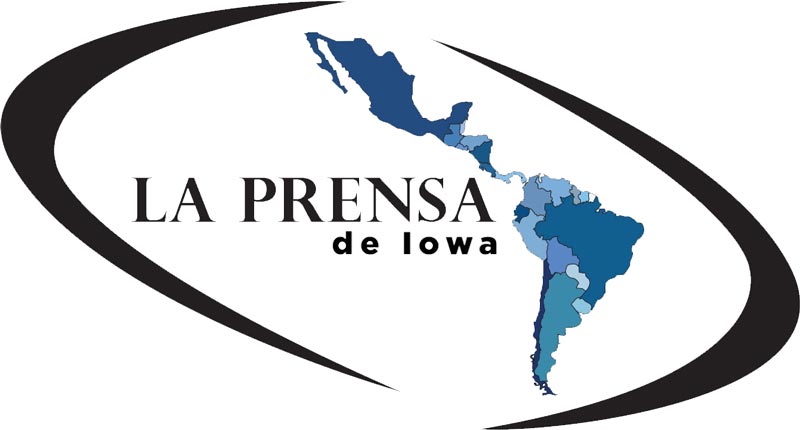Economista advierte: “Prepárese para lo peor”
/El economista de Iowa State University, Peter Orazem aconseja tomar oportunidad de la alta demanda laboral que actualmente existe a nivel del país y sobre todo a nivel del estado de Iowa. “El mes pasado, existían al menos dos oportunidades de empleo por cada individuo desempleado en los Estados Unidos.” Ashley Martínez Torres/Especial para LA PRENSA Iowa.
Los precios siguen en aumento
Ashley Martínez Torres
Especial para LA PRENSA Iowa
No es nada nuevo saber que la pandemia trajo consigo no solo hospitalizaciones y muertes, sino también la pérdida de empleos y una alta demanda por los productos de necesidades básicas. Sin embargo, a dos años de la llegada de la pandemia, la economía aun no ha logrado estabilizarse completamente e incluso pareciera que esta empeorando. Los precios continúan en aumento, la cadena de suministros se sigue atrasando y muchas personas han perdido sus empleos mientras que otros renuncian para buscar mejores salarios.
Profesor de Economía Laboral Peter Orazem. Foto cortesía de Iowa State University.
El profesor de economía laboral de Iowa State University Peter Orazem explicó algunos de los factores de la actual inflación, “Lo que ha creado un incremento en los precios de los productos que los consumidores tienden a comprar repetidamente, como es la comida y la gasolina es la disrupción que creo la pandemia alrededor del mundo, y ahora el reciente conflicto entre Rusia y Ucrania.”
Según el economista, una forma en la que la Reserva Federal trata de combatir la inflación es incrementando la tasa de interés para tratar de reducir la demanda de productos y servicios. Sin embargo, el precio en los productos básicos ha incrementado mucho más rápido que los salarios laborales, y esto dificulta el ajuste de presupuestos en varios hogares, especialmente aquellos que reciben el salario mínimo.
La Reserva Federal es el banco central de los Estados Unidos a cargo de imponer pólizas que ayudan a mantener la economía estable y controla el abastecimiento de dinero, entre otras cosas.
Cabe agregar que el incremento en la tasa de intereses trae consigo el riesgo de que el país caiga en una recesión si los intereses llegarán a ser muy altos.
“Va a ser muy complicado para la Reserva Federal el seguir incrementando la tasa de interés sin recibir repercusiones negativas y un probable incremento en la tasa de desempleo,” explicó Peter, agregando, “Y no hay manera de que la tasa de inflación disminuya sin la posibilidad de caer en recesión.”
Cómo me prepararse para la posibilidad de una recesión
Los Estados Unidos no habían caído en una situación económica de esta magnitud por más de 30 años; El incidente más reciente ocurrió ente 1980 a 1982, donde la Reserva Federal incremento la tasa de intereses tan rápido que terminaron con una tasa de desempleo del 10.8 por ciento y una tasa de interés arriba del 12 por ciento.
A pesar de que los trabajos de hospitalidad, como en el área médica, han perdido a una gran cantidad de trabajadores, Peter piensa que estos puestos se llenarán rápidamente si el país cayera en recesión. Sin embargo, otros trabajos como construcción y manufactura podrían estar en peligro.
“Estos trabajos tienden a ser más sensibles al ciclo de demanda laboral, mientras que los trabajos en servicios son menos sensibles y los trabajos en el gobierno son más estables,” explicó Peter.
Peter aconsejó que las personas que trabajen en construcción o manufacturación deben de aprovechar las oportunidades de trabajo que tengan e incluso, si es posible, trabajar horas extra para compensar la falta de trabajo en caso de que se llegue a una recesión.
Por su parte, el propietario de Govari Construction José Godínez comentó, “No estoy tan preocupado por el trabajo, sino por los materiales que se necesitan ya que últimamente tardan más tiempo en llegar, y sería bueno que pudiera abastecerme del material de construcción para usarlo en el futuro solo para estar preparado en de que haya escases.”
Según Peter, una manera de estar preparados para una posible recesión es asegurar un empleo antes que el flujo de la demanda laboral disminuya, ya que esto dificultara las opciones de empleo disponible para un individuo. “Con el incremento de precios, lo menos que quieres hacer es quedarte sin hacer nada porque tienes que asegurarte de tener al menos una fuente de ingresos,” explicó. “Por otro lado, si ya tienes empleo, es buena idea buscar un segundo empleo ya que esto servirá para asegurar traer algo de dinero a la casa en caso que pierdas o te despidan del otro empleo.”
Peter también comento que para las familias que cuentan con mas de una persona capaz de trabajar, deberían tomar ventaja de recibir más de un ingreso por familia ya que eso “crearía mejor estabilidad financiera para el hogar, sobre todo durante una recesión.”
De igual manera, el economista recomienda evitar endeudarse a largo plazo con la compra de productos caros o pedir préstamos ya que los intereses seguirán incrementando, y que en estos momentos el enfoque de la familia debería radicar en la compra de productos de necesidades básicas, tratar de comenzar una cuenta de ahorro. Asimismo, recomienda mantener una cuenta bancaria de fácil acceso dinero en caso de una emergencia.
“Estamos pasando por unos momentos difíciles, sobre todo porque muchas familias no habían experimentado un entorno inflacionario de esta magnitud, lo que significa que mucha gente no está preparada para lo que podría pasar,” Explicó. “Tenemos que ajustarnos rápidamente a este tipo de cambios, y enfocarnos en las necesidades básicas y solo así podremos sobrevivir a esta tormenta aun cuando esta se vuelva aún más complicada.”
Por su parte Maggie Reyes de Upper Des Moines Opportunity (UDMO) en Storm Lake dijo que el número de personas que asisten a UDMP para solicitar asistencia financiera o de víveres ha incrementado, por lo que tuvo que solicitar a la oficina central de Des Moines un aumento de dinero para la compra de víveres. “Antes pedíamos $500 mensuales y ahora pedimos $1,200 porque ahora en nuestra oficina tenemos más gente que necesita ayuda porque el incremento de os precios se ha disparado tanto que la gente cada vez más está solicitando más ayuda para poder alimentar a sus familias.”
Según la Oficina de Estadísticas Laborales de los Estados Unidos (U.S Bureau of Labor Statistics por su nombre en inglés), el Índice de Precios al Consumidor (CPI por sus siglas en inglés) ha incrementado el 8.6 por ciento entre mayo del 2021 a mayo del 2022, lo que lo hace el incremento de 12 meses más alto desde el final de diciembre de 1981.
Este artículo es patrocinado gracias al patrocinio de Western Iowa Journalism Foundation.
Translation
"Prepare for the worst"
Prices keep increasing
“The liberal market is extremely hot, so you have to take advantage of it,” Peter Orazem said. “A month ago, there were at least two job openings for every unemployed person in the U.S.” Ashley Martínez Torres/Special for LA PRENSA Iowa.
Ashley Martínez Torres
Special for LA PRENSA Iowa
It is nothing new that the pandemic brought not only hospitalizations and deaths, but also a loss of jobs and a high demand for basic necessities. However, two years after the arrival of the pandemic, the economy has not yet managed to fully stabilize, and it even seems to be getting worse. Prices continue to rise, disruptions on the supply chain continues and many people have lost their jobs while others quit theirs to look for better salaries.
Professor in Labor Economics Peter Orazem. Photo courtesy of Iowa State University.
"I was really sad to see families lose their jobs to COVID either because of their health or because they were let go," Buena Vista County Upper Des Moines Opportunity (UDMO) Outreach Specialist Maggie Reyes said.
The number of people attending UDMP for financial assistance or food has increased in the last two years, to the point where Reyes had to increase the monthly budget for groceries spending.
"We used to ask for $500, and now we ask for $1,200 because I have more people than before,” she said. “These are people who have not been able to recover financially and the increase in prices is not helping them."
According to the U.S. Bureau of Labor Statistics, the Consumer Price Index (CPI) has increased 8.6 percent between May 2021 and May 2022, making it the highest 12-month increase since late December 1981.
"Due to the disruption created by the pandemic around the world, and now the recent conflict between Russia and Ukraine, this has created an increase in the prices for products that consumers tend to buy repeatedly, such as food and gasoline," Professor of Labor Economics at Iowa State University Peter Orazem said.
According to Orazem, one way the Federal Reserve tries to combat inflation is by raising the interest rate to try to reduce demand for products and services. However, the price of necessities has increased so much faster than wages, which makes it difficult for many low-income households to adjust their budgets.
The Federal Reserve is the central bank of the United States in charge of imposing policies that help keep the economy stable and controls the supply of money, among other things.
However, the increase in the interest rate comes with the risk that the country will fall into a recession if interest rates become too high.
"It's going to be very difficult for the Federal Reserve to keep raising the interest rate without negative repercussions and a likely increase in the unemployment rate," Orazem explained. "There is no way they will lower inflation without increasing the chance of falling into recession."
How do I prepare for the possibility of a recession?
The United States have not seen an economic situation of this magnitude for more than 30 years; The most recent incident occurred between 1980 and 1982, where the Federal Reserve raised the interest rate so quickly that they ended up with an unemployment rate of 10.8 percent and an interest rate above 12 percent.
Even though hospitality jobs have lost a large number of workers, Orazem belives that these positions will be filled up quickly if the country were to fall into recession. However, other jobs such as construction and manufacturing could be at risk.
"These jobs tend to be more sensitive to the labor cycle, while jobs in services are less sensitive and jobs in government are the least sensitive," he explained.
Orazem advised that those who work in construction or manufacturing should take advantage of the job opportunities they have and even, if possible, work overtime to make up for shortage of work in the event of a recession.
"I am not that worried about the work, but about the materials I need since lately they take longer to arrive." Govari Construction Owner José Godínez said. "In that case I would have to start buying wholesale materials that I could use in the future just to be prepared in case there is a shortage."
According to Orazem, one way to be prepared for a possible recession is to secure a job before the flow of labor demand reverse, as this will hinder employment options available to the public.
"With the price increase, the least you want to do is stand on the side, because you have to make sure you have at least one source of income," he explained. “On the other hand, if you already have a job, it is a good idea to look for a second job as this will serve as an insurance in case you are fired from one of the two jobs."
Orazem also commented that for those families that have more than one person available to work, they should take advantage of receiving more than one income per family as this would "create better financial stability for the household, especially during a recession."
"If I were to lose my job in construction, I would have the opportunity to help my children's mother at her daycare or crystal shop, Sweet Peas," Godinez said. "People have to ask themselves, 'What am I going to do if this affects me?’ It's a lot to think about and plan for, because it's not the same to be mentally prepared to financially prepared."
On the other hand, Orazem also recommended avoiding long-term debt by buying expensive products or borrowing as interest will continue to rise, but people should focus on buying basic necessities and start a savings account if possible; As well as he recommend that families make sure to keep their money in easily accessible accounts in case of emergency.
"We are going through some difficult times, especially because many families had not experienced an inflationary environment in this way, which means that many people are not prepared for what could happen," Orazem explained. "We have to adjust quickly to these kinds of changes, focus on basic needs, and only then can we survive this storm even as it becomes even more complicated."
This article is sponsored by the Western Iowa Journalism Foundation.










































